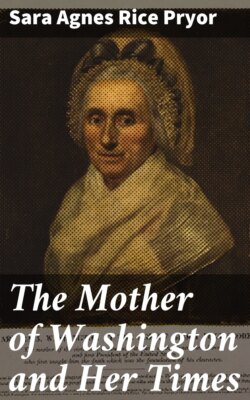Читать книгу The Mother of Washington and Her Times - Sara Agnes Rice Pryor - Страница 10
На сайте Литреса книга снята с продажи.
MARY WASHINGTON'S ENGLISH ANCESTRY
ОглавлениеTable of Contents
The family of Ball from which Mary, the mother of Washington, descended, can be traced in direct line only as far back as the year 1480. They came originally from "Barkham, anciently 'Boercham'; noted as the spot at which William the Conqueror paused on his devastating march from the bloody field of Hastings:[1] 'wasting ye land, burning ye towns and sleaing (sic) ye people till he came to Boerchum where he stayed his ruthless hand.'"
In the "History of the Ball family of Barkham, Comitatis Berks, taken from the Visitation Booke of London marked O. 24, in the College of Arms," we find that "William Ball, Lord of the Manor of Barkham, Com. Berks, died in the year 1480." From this William Ball, George Washington was eighth in direct descent.
The entry in the old visitation book sounds imposing, but Barkham was probably a small town nestled amid the green hills of Berkshire, whose beauty possibly so reminded the Conqueror of his Normandy that "he stayed his ruthless hand." A century ago it was a village of some fifty houses attached to the estate of the Levison Gowers.
There is no reason to suppose that the intervening Balls in the line—Robert, William, two Johns—all of whom lived in Barkham, or the William of Lincoln's Inn, who became "attorney in the Office of Pleas in the Exchequer," were men of wealth or rank. The "getting of gear was never," said one of their descendants, "a family trait, nor even the ability to hold it when gotten"; but nowhere is it recorded that they ever wronged man or woman in the getting. They won their worldly goods honorably, used them beneficently, and laid them down cheerfully when duty to king or country demanded the sacrifice, and when it pleased God to call them out of the world. They were simply men "doing their duty in their day and generation and deserving well of their fellows."
They belonged to the Landed Gentry of England. This does not presuppose their estates to have been extensive. A few starved acres of land sufficed to class them among the Landed Gentry, distinguishing them from laborers. As such they may have been entitled to the distinction of "Gentleman," the title in England next lowest to "Yeoman." No one of them had ever bowed his shoulders to the royal accolade, nor held even the position of esquire to a baronet. But the title "Gentleman" was a social distinction of value. "Ordinarily the King," says Sir Thomas Smith, "doth only make Knights and create Barons or higher degrees; as for gentlemen, they be made good cheap in this Kingdom; for whosoever studieth the laws of the realm, who studieth in the universities, who professeth the liberal sciences, he shall be taken for a gentleman; for gentlemen be those whom their blood and race doth make noble and known." By "a gentleman born" was usually understood the son of a gentleman by birth, and grandson of a gentleman by position. "It takes three generations to make a gentleman," we say to-day, and this seems to have been an ancient rule in England.
The Balls might well be proud to belong to old England's middle classes—her landed, untitled Gentry. A few great minds—Lord Francis Verulam, for instance—came from her nobility; and some gifted writers—the inspired dreamer, for instance—from her tinkers and tradesmen; but the mighty host of her scholars, poets, and philosophers belonged to her middle classes. They sent from their ranks Shakespeare and Milton, Locke and Sir Isaac Newton, Gibbon, Dryden, "old Sam Johnson," Pope, Macaulay, Stuart Mill, Huxley, Darwin, Wordsworth, Coleridge, Burke, Disraeli, Cowper, Sir William Blackstone, and nearly all of the Chief Justices of England. These are but a few of the great names that shine along the ranks of England's middle classes.
Many of these men were called to the foot of the throne by a grateful sovereign to receive some distinction—so paltry by comparison with glory of their own earning—and among them came one day an ancestor of the mother of George Washington. Who he was we know not, nor yet what had been his service to his country; but he was deemed worthy to bear upon his shield a lion rampant, the most honorable emblem of heraldry, and the lion's paws held aloft a ball! This much we know of him—that in addition to his valor and fidelity he possessed a poet's soul. He chose for the motto, the cri de guerre of his clan, a suggestive phrase from these lines of Ovid:—
"He gave to man a noble countenance and commanded him to gaze upon the heavens, and to carry his looks upward to the stars."
